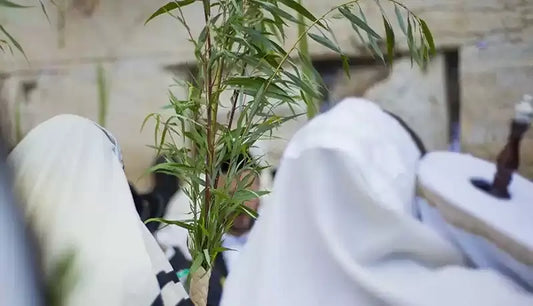FAQ Series in Memory of Ralph and Ruth Gindi
Rabbi Hayim Asher Arking
Rabbi Ezra Ghodsi
The gradual entry into the most reflective day in our history starts with the Fast of the 17th of Tammuz and continues for the following three weeks. During this time period, we slowly add to our mourning and refrain from more and more pleasures until we reach Tisha B’Av itself.
What do we do differently during the three weeks?
Starting from the night prior to the fast of Shivah Asar B’Tammuz, and throughout the entire three-week period, we do not get married, listen to music, dance, or recite shehehianu on new clothes or a new fruit. One should also avoid potentially dangerous activities.
During this time, it is also very powerful to recite Tikkun Hatsot. Although normally recited at midnight, during this time, it is also recited at midday.
Can I buy new clothes during the three weeks?
Although, as mentioned, we do not recite shehehianu, however, for regular everyday clothes or any other items that do not require a shehehianu, they may be purchased and even worn for the first time during the three weeks.[1]
As we enter Rosh Hodesh Av, we step up our cognizance of mourning the Bet Hamikdash. During this time, we refrain from numerous things that bring a person joy. It is also a time of bad ‘mazal’ and therefore if one has a court case with a non-Jew, he should try to push it off.
In a regular year, the week of Tisha B’Av (referred to in halacha as “Shavua She’hal Bo”), we add another level of mourning by refraining from wearing fresh clothes, bathing, etc. However, this year, when Tisha B’Av is on Sunday, these laws will not apply during the week prior.
Can I buy new things during the nine days?
During the nine-day period starting from Rosh Hodesh Av, we refrain from significant purchases that bring a person joy, for example, expensive purchases like furniture, jewelry, or items for a wedding. However, if a household appliance such as a dryer breaks, and it is necessary to buy a new one, then it would be permitted.[2] Small purchases like basic household items would always be permitted.
Can I sew during the nine days?
One may not sew or tailor new clothing during the nine days. However, if a garment is ripped, it may be repaired.[3]
Can I paint my house?
Painting or any other renovations are not permitted during the nine days. Similarly, planting flowers, bushes, etc. would also not be permitted. If one already hired a non-Jewish contractor, a Rabbi should be consulted.
Until when can we eat meat and drink wine?
Although the other restrictions of the nine days begin on Rosh Hodesh, one can still eat meat or drink wine in honor of Rosh Hodesh until sunset. However, if one prayed Arbit early, he would not be able to eat meat even if it is not yet sunset. This year, when Rosh Hodesh is on Shabbat, one can eat meat or drink wine by Seudah Shilishit even after sunset.[4]
Can I eat a “meat” soup if I’m not eating the actual chicken or meat?
One cannot eat food cooked together with meat, such as eating the vegetables or broth of a soup, even if they are not eating the actual meat. However, one can use meat pots and pans to cook their food.
Wine can be used in cooking if it is one of many ingredients and does not give a noticeable taste. Wine vinegar, may always be used as it is no longer considered wine.
Can I feed my kids chicken and meat during the nine days?
There is more room to be lenient with feeding a young child meat or chicken, especially if it is necessary for them.[5] According to all, on Erev Shabbat in the afternoon, one can feed kids the meat or chicken that was prepared for Shabbat.[6]
Can I taste meat food on Erev Shabbat?
For someone cooking for Shabbat, tasting and even swallowing the food is permitted in order to evaluate it.[7]
Can I shave or get a haircut during the week prior to Tisha B’Av?
In a normal year, getting a haircut or shaving is one of the restrictions during the week of Tisha B’Av. This year, when Tisha B’Av falls on Sunday and other restrictions do not apply, it is preferable to avoid getting a haircut or shaving on the preceding Friday to avoid entering the fast freshly groomed.[8]
May I change my clothes on Shabbat to wear them on Tisha B’Av?
As mentioned, during the week preceding the fast, one may wear freshly laundered clothes. On Tisha B’Av itself, however, one may not wear freshly laundered clothes. The clothes would have to be worn for at least a short period of time before Shabbat. One may not put on clothes for this specific purpose on Shabbat, as this would be preparing for a weekday, which is not permitted. If it is not noticeable that the clothes are being worn for this purpose, then it is permitted. For example, one may change into a new pair of clothes after taking a nap, even though he normally puts back on the same clothes, provided that what he is wearing is befitting to be worn on Shabbat.
Do I do anything different by Seudah Shilishit?
In a regular year before Tisha B’Av, we eat the Seudah Ha’mafseket. This year, the last meal before the fast will be Seudah Shilishit. One should conduct a normal and full Seudah Shilishit so as not to infringe on the honor of Shabbat. One may continue to eat after Birkat Ha’mazon, provided it is not yet sunset.[9]
After slowly increasing our mourning over the past three weeks, we finally reach the pinnacle on Tisha B’Av. On this day, there is: 1) No eating or drinking; 2) No washing; 3) No applying creams or oils to one’s skin; 4) No leather shoes; 5) No marital relations. We also sit on the floor, not on regular chairs, similar to mourners.
When does the fast start?
The fast starts at sunset (approximately 8:08 in the NY/NJ area). However, one must stop eating a few minutes before sunset and ensure no food particles are left in his mouth. If one is saying Birkat Ha’mazon after sunset, since the meal started on Shabbat, the passage of Retzei is still recited.
When should I take off my leather shoes?
Although the fast starts at sunset, we do not proactively show signs of mourning before Shabbat is over. One should not remove his shoes or sit on the floor until 40 minutes after sunset. At that point, one should say “Baruch Hamavdil Bein Kodesh L’hol,” and remove his shoes and Shabbat clothes.[10]
What are we allowed to sit on?
One can sit on a low cushion, pillow, or anything less than a tefah high (3 to 3.2 in.), or, according to many, even a stool of less than three tefahim high (9 to 9.6 inches).[11]
When sitting on the floor, one should still stand for a parent, Rabbi, or elderly person.[12]
When do we recite Havdalah?
Havdalah is not recited on Motsei Shabbat, as we are not allowed to drink the wine. Only the beracha of “Borei Me’orei Ha’esh” is recited, while the berachot of Hagefen and Hamavdil are recited on Sunday night after the fast. The custom is to recite the beracha of “Borei Me’orei Ha’esh” in shul before the kinot. One should take care to be close enough to the candle that he would be able to differentiate between two types of coins by its light. Women who do not come to shul should light a candle and recite the beracha at home.
What about someone who is ill and cannot fast?
One who is ill and allowed to eat on Tisha B’Av should recite the full Havdalah (without the beracha of besamim) on Motsei Shabbat and drink a “Me’lo Lugmav” (lit. a cheek full;1.6 fl. oz) of the wine or grape juice.[13] If he cannot drink that much, then it could be given to a child between six and nine years old to drink.[14] A minor who has reached the age of hinuch should also recite Havdalah before eating on Tisha B’Av.[15]
May I clean the house?
One should not sweep, wash the floors, wash dishes, or engage in any extended clean-up on Tisha B’Av until after midday, hatsot, on Sunday (approximately 1:02 PM in the NY/NJ area). Dirty dishes, however, may be placed in the dishwasher and turned on. If leaving them in the sink will cause the house to smell or attract flies, one may wash them even by hand (and it is not necessary to wear gloves).[16]
Can I brush my teeth?
Tisha B’Av is more stringent than regular fasts, and it is not permitted to rinse out one’s mouth or brush teeth. If one is very uncomfortable or has bad breath, he can use mouthwash (without rinsing with water afterward), but he should tilt his head downward to avoid swallowing it.[17]
Can I take medicine for a headache?
If one has a headache, he may swallow a pill without water, provided that it does not have a flavored coating. Other medications are also permitted; however, vitamins and health items should not be taken. If one is unable to swallow the pill without water, a Rabbi should be consulted.[18]
How do I wash my hands?
In the morning, one should wash his fingers up to the third knuckle three times. One who has the custom during the year to wash their hands three times after entering a restroom may do so, but only up to the knuckles.[19]
One who is sick and washing for bread should wash his hands like he does throughout the year – up to the wrist. Similarly, the Kohanim should also wash up to the wrist, but they should only wash each hand one time. When a Levi washes his hands prior to washing the Kohanim’s hands, he can only wash up to the knuckles.[20]
My hands got dirty, can I wash them?
Any washing for cleanliness (such as for unclean hands or even to remove gunk around the eye in the morning) is permitted. However, only the dirty area may be washed, and not the rest of the hand. If one touches his shoe, only the part of the hand that touched the shoe should be washed. An exception is when someone touches a covered part of their body, requiring washing before reciting a beracha or praying; in this case, the hand should be washed up to the knuckles.[21]
Is it permitted to wash my hands with soap?
Applying creams, oils, etc., is only prohibited if done for pleasure or enjoyment. However, when done for cleanliness, such as if one’s hands are dirty and they need soap to clean them, it is permitted. It is also permitted to use Purell to disinfect if necessary.[22]
Can I use deodorant?
Deodorant (even with a good smell) may be used, as it is for cleanliness and not for pleasure.[23]
What if only part of the shoe is leather?
Shoes with even a leather sole or leather top may not be worn. However, if there is a small strip of leather intended for decorative purposes only, it may be worn. Similarly, a pair of flip-flops that has only a thin strap to hold the foot in place and does not protect the foot is also permitted.[24]
What if I don’t have any non-leather shoes?
If one is worried that he will get hurt or dirty, then he may wear leather footwear outside if he has no other option. For example, if it is pouring rain or muddy, one may wear appropriate shoes or boots outdoors to remain dry and clean. However, they should be removed immediately when entering the house, shul, or car.[25]
Can children wear leather shoes?
Being that young children generally have a non-leather option, they should not wear leather shoes.[26]
Can I read Tehillim?
On Tisha B’Av, the regular study of Torah is not permitted, as Torah brings a person joy. However, one should study the Gemarot and Midrashim that discuss the destruction of the Bet Hamikdash. One may also study the laws of Tisha B’Av or the laws of avelut. It is also permitted to study Sefarim that encourage a person to reflect on his sins and do teshuva.
Reading Tehillim is also like studying Torah, and should not be done unless one is praying for something specific, such as a sick person. Therefore, one who is unable to study the parts of Torah permitted on Tisha B’Av and wants to read his set amount of Tehillim should read the Tehillim as prayer for a sick person or for another need.[27]
Can I wish someone good morning?
Due to the somber mood of the day, one should not greet their friend with common greetings such as ‘hello’, ‘good morning’, ‘how are you?’, and the like. If one was greeted by somebody who is unaware of this Halacha, he should respond in a soft and serious tone.[28]
What type of work is prohibited on Tisha B’Av?
One may not conduct any form of business, or buy/sell anything, including online purchases. (If there is potential for a loss, or if it is a rare opportunity, a Rabbi should be consulted). Even before hatsot, it is permitted to buy food that will be needed for after the fast.[29]
Can one smell besamim?
One should not smell besamim on Tisha B’Av.[30] In order to recite the required 100 berachot, one should listen to the berachot on keriat HaTorah and have in mind to fulfill his obligation with that.[31]
What else should we do or not do?
One should not engage in fun activities or socialize, as the mood of the day should be one of mourning and solitude, to enable us to reflect on how we can rebuild the Bet Hamikdash. One should even refrain from sitting with a child on his lap for no reason, so he won’t end up playing with them. However, it is permitted to do so for a specific purpose, such as to calm the child.[32]
What can be done after hatsot?
After hatsot (approximately 1:02 p.m. in the NY/NJ area), one may sit on a regular chair. At that point, it is also permitted to start preparing food, cleaning up the house, or washing the dishes.[33] All other restrictions are still in place until the fast is over.
What parts of Havdalah are recited after the fast?
After the fast is over, one may not eat or drink anything, except for water, until after Havdalah is recited. This applies to both men and women. When making Havdalah upon breaking the fast, we do not recite the introductory pesukim of havdalah. Only the berachot of Hagefen and Hamavdil are recited, while the berachot on the besamim and the candle are omitted.[34]
What activities are permitted after the fast is over?
After the fast, it is permitted to shower, shave, or freshly wear laundered clothes. Many have the custom not to eat meat or drink wine until the end of the 10th of Av. This is because, although the Bet Hamikdash was set on fire on Tisha B’Av, most of the burning occurred on the 10th. For this reason, the beracha shehehianu should not be recited on this day either.
May we merit to see the building of the Bet Hamikdash speedily in our days, Amen.
[1] משנ"ב סי' תקנ"א ס"ק מ"ה.
[2] עי' חזו"ע עמ' קס"ז, ותורת המועדים עמ' קמ"ב.
[3] חזו"ע עמ' ר"ז.
[4] כה"ח סי' תקנ"א ס"ק קכ"ב.
[5] עי' חזו"ע עמ' ק"צ.
[6] עי' בכה"ח שם ס"ק קנ"ה. וע"ע בשו"ת אגרות משה ח"ד סי' כ"א.
[7] חזו"ע עמ' קע"ה.
[8] כה"ח ס"ק ע"ח, חזו"ע עמ' רכ"ד.
[9] משנ"ב שעה"צ סי' תקנ"ג אות ז'. ועי' בחזו"ע עמ' ער"ה.
[10] חזו"ע עמ' של"ד.
[11] עי' חזו"ע עמ' רע"ג.
[12] חזו"ע עמ' של"ב.
[13] חזו"ע עמ' שמ"ח הע' ח', אול"צ פכ"ט אות ח'.
[14] ילקוט יוסף עמ' תצ"ה.
[15] חזו"ע עמ' שנ"ב, אול"צ פכ"ט אות ח', ועוד הרבה פוסקים. ויש חולקין.
[16] עי' באור לציון פכ"ט אות י"ד, ובקובץ הלכות עמ' רכ"ח. ומש"כ שאי"צ ללבוש כפפות, עי' בחזו"ע עמ' רצ"ד, ובקובץ הלכות עמ' ר"כ.
[17] תורת המועדים סי' א' סעי' י"א. קובץ הלכות עמ' רכ"ו.
[18] שושנת ישראל עמ' קכ"ב.
[19] שו"ע סי' תקנ"ד סעי' י'.
[20] חזו"ע עמ' ר"צ- רצ"א.
[21] שו"ע שם סעי' ט', י"א. משנ"ב סי' תרי"ג ס"ק ו'.
[22] שו"ע שם סעי' ט"ו.
[23] חזו"ע עמ' רצ"ה.
[24] חזו"ע עמ' ש"א. קובץ הלכות עמ' רכ"ד.
[25] עי' שו"ע סי' תקנ"ד סעי' י"ז. כה"ח ס"ק ע"ט.
[26] עי' חזו"ע עמ' ש"א, ושיעורי הלכה עמ' תקי"א.
[27] חזו"ע עמ' שי"א, שט"ז.
[28] שו"ע שם סעי' כ'.
[29] שו"ע שם סעי' כ"ב – כ"ג. כה"ח ס"ק ק"ו. חזו"ע עמ' שכ"ב.
[30] כף החיים סי' תקנ"ו סק"ד. חזו"ע עמ' של"ט.
[31] בן איש חי פרשת בלק הל' א'.
[32] שו"ע שם סעי' כ"א. חזו"ע עמ' של"ג.
[33] חזו"ע עמ' שכ"ד.
[34] חזו"ע עמ' של"ו ו-של"ח.




